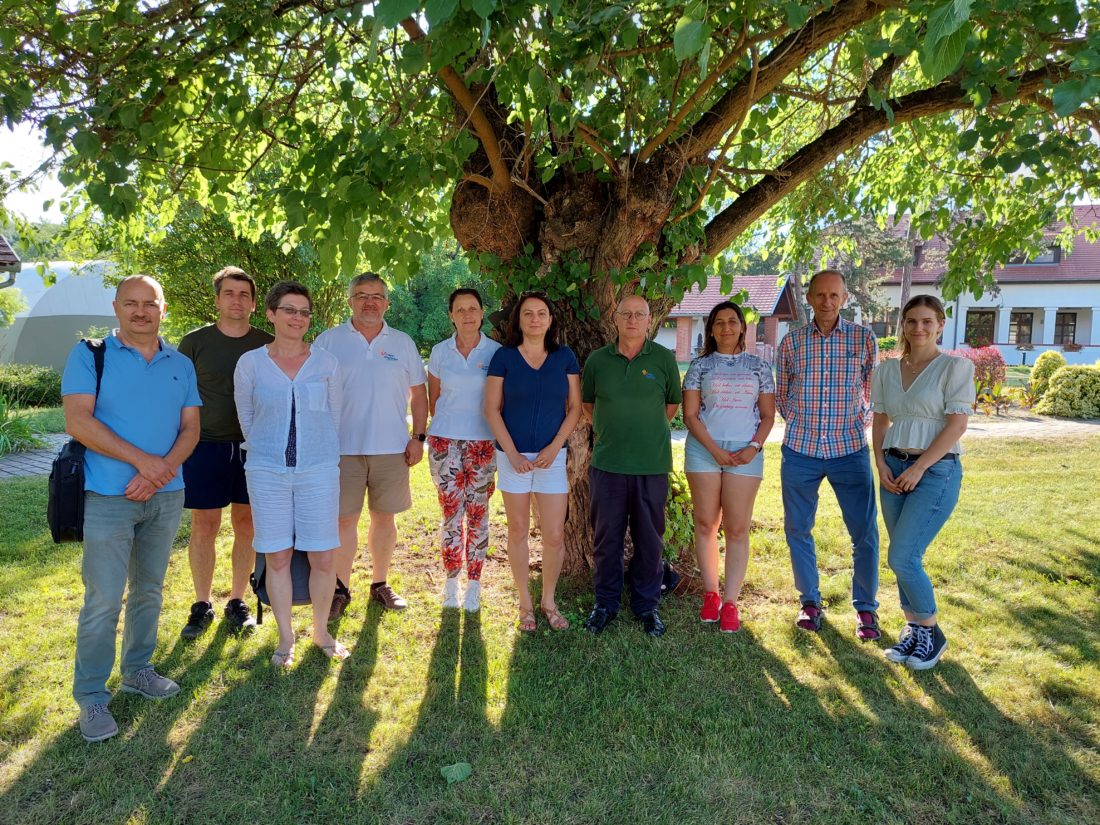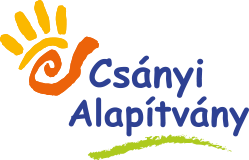
Interjú az Okos Dobozzal
The processing of the theme of social relationships by Okos Doboz will continue in the fall – on November 9, the Foundation’s working group met to discuss how to implement the Okos Doboz curriculum most effectively into the sessions. In the next semester, the youngest groups of the Community Houses in Mohács and Kaposvár will have the opportunity to delve into the often complex maze of social relationships.
As a teaser for the courses of the next semester, we share a summer moment – an interview with János Szlankó, the founder of Okos Doboz [hereinafter referred to as Okos Doboz – the editors].
Sarlóspuszta. After the morning’s flurry of events, the children slowly quiet down – a subconscious preparation for the afternoon’s emotional deep dive? Perhaps one of the most anticipated events of the finance and drama camp is the sensitivity session after lunch, where children can delve into the world of emotions under the guidance of drama educators. Facing the often intangible – or rather inexpressible – emotional knots is often a challenge for adults too – and as with so many other things, these emotional lumps seem even bigger, even more intangible to children. Perhaps that’s why it’s not surprising that the camp participants are the most enthusiastic in unraveling the threads of their emotions – the spool is provided by Okos Doboz, who with a well-developed structure makes the path of skill development safe.
We are also curious about the results – because the only way to development is observation and drawing conclusions, then building on them. Thus we met in Sarlóspuszta, where they also had time for a quick interview between the application evaluation meeting and the actual session viewing.
Csányi Foundation: If you had to describe Okos Doboz in three words, what would they be?
Okos Doboz: Child-centric, diverse, and lovable. It seems to be true, as I often meet children in everyday life and when they find out I am from Okos Doboz, they immediately say, ‘Wow, my child loves it and uses it much more than other teaching tools.’ I would also say beautiful, child-centric, and innovative, adds János Szlankó, strategic advisor. Beautiful, because we place great emphasis on visual aesthetics, it is important to us that what we create is beautiful. Our goal is for children to return to the site with enjoyment after the teacher has introduced the material in the classroom. It’s important that the teacher loves the tool, but most importantly, that the child goes to it on their own, that they love it.
Csányi Foundation: What was the seed of the initiative? Where did the idea for Okos Doboz come from?
Okos Doboz: I have always liked games, playful tasks, and I consider health important, I have been preoccupied with health-related knowledge for a long time. Then fate brought me to work with children, and eventually, I plunged into Okos Doboz. The idea was that Okos Doboz had to be playful and beautiful and work like a repository of knowledge that provides knowledge beyond the curriculum, things that children don’t learn in school, though the application of what is learned would be important in school life. We can see that our knowledge is connected to a direct line. And there is such a field of knowledge that is not taught in school, though it should be. These include supplementary skills: social skills and health-related knowledge.
Csányi Foundation: So we could say that what makes Okos Doboz special is that it strengthens special areas, that it is beautiful and playful and easy to handle.
Okos Doboz: Yes. And yes, the imparted knowledge is also special: the goal is not the school curriculum, but the strengthening of important skills, areas in school. Such as cognitive ability, social skills, and often teachers are not trained or do not have the right tools for development. It is important to emphasize that we do not assess, but develop.
Csányi Foundation: I first encountered Okos Doboz on the Hungarian Forbes magazine’s website when the site’s traffic exploded at the start of the pandemic. How much has this trend remained?
Okos Doboz: The number of visitors has decreased somewhat. There are two reasons for this, one is that they discovered that there are many sites where more creative teachers can compile their own teaching material. This is the smaller part. The other part is that in the meantime, in the fall of 2021, the online textbook library became available, which contains textbooks, and some users are now using it, so obviously, the number of visitors has decreased.
Csányi Foundation: How did the collaboration with the Foundation start?
Okos Doboz: We had a connection through which our paths crossed. Then we sat down and it was immediately apparent that there were common areas, and there was harmony right away. From then on, there was no question that we would like the Foundation to use Okos Doboz. From the feedback we receive, we can also continue to develop.
Csányi Foundation: The collaboration with the Foundation has recently started, within which the children use the platform under the guidance of drama educators, and then we share the experiences. Do we see how this will continue in the future? Are there specific goals?
Okos Doboz: We would like the children of the Csányi Foundation, their guard, to use this application and have the opportunity to develop – just as we have the opportunity to develop based on the feedback from the Foundation. We also realized how central the role of the teacher is in a session, which we experienced here: it really matters who is leading the session. We see that there are excellent drama educators at the Foundation, who can process the topics wonderfully, and the children react sensitively to them. We’ll see what the future brings, but we’d like to get in touch with more groups from other houses as well. It’s certain that we get very valuable feedback from which we can really develop.
Csányi Foundation: There was a sentence during the session evaluation discussion that I liked so much that I picked it out: That children at the Foundation are much more in need of this development than, say, in another environment.
Okos Doboz: I wouldn’t necessarily say more so, but it’s interesting to test the curriculum in different environments – obviously, the result here will be different than in a sterile, psychologist-designed test, as the children here are often more socially sensitive, and it’s interesting to see the differences. We also learn from this.
There was no more time for the conversation, as the sessions were about to start, where we could see in practice how Okos Doboz and the Foundation work together. The success of the sensitization can best be measured by looking through the eyes of the participants at the events of the week:
In the 5th-grade Financial and Drama Camp, we had the opportunity to test the social skills development practice package provided by the Okos Doboz team. This gave us a useful tool in our hands, which we evaluated day by day with my drama teacher colleague, Zoltán Papp, the developer. In the afternoon sessions, we prepared by tailoring the available videos and tasks to the groups, enriching them with drama games, situational exercises.
With this, we aimed to deepen the knowledge, experience the emotions, and tune in to each other, pay attention. Social relationships are of paramount importance in the lives of adolescents, it is important that we can influence how they think about themselves, their peers, and the world. We will feedback our experiences gained during the training to the developers of Okos Doboz so that a widely applicable training package can be assembled.
We are grateful to the Okos Doboz team for the initiative, as the development of emotional intelligence, strengthening the social relationships of children has always been in focus in the programs of our Foundation.
Zsuzsa Vida, lead drama educator of the session
Interview conducted by:
Bianka Járay


